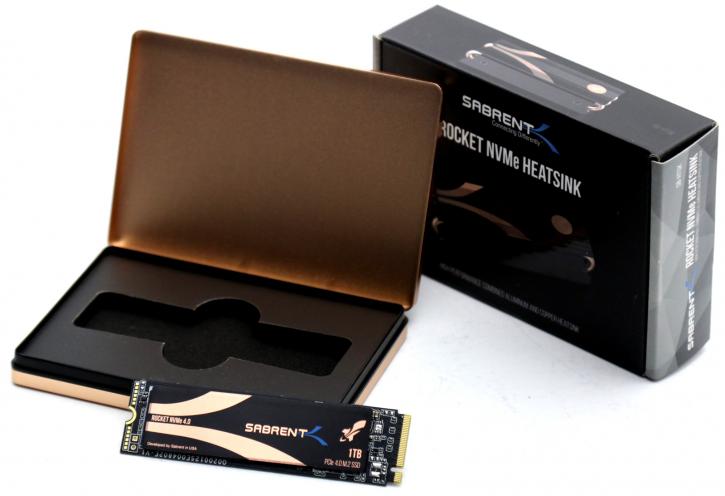Final Words & Conclusion
Final Words & Conclusion
Sabrent is a brand that is growing in popularity due to its aggressive pricing. And quite honestly they have been offering very potent M2 SSDs with the Rocket series. When we received the NVME4 version of the Sabrent Rocket I expected its performance to be 100% similar towards the MP600 series from Corsair. Well, it seems that over time the ODM has made some updates to its firmware as especially in read performance there are differences to be measured, this SSD hits that 5 GB/sec marker. But I do say that with some reservation as things in the NAND arena always are very relative though; performance differs per workload. Strictly speaking from noting down the highest values, this was among the fastest SSD we have ever tested. But if you look at it relatively averages towards other SSDs, it's simply put an enthusiast-class performing TLC M.2 SSD.
We haven't noticed significant enough perf drops due to TLC, triple-level cell written NAND (and QLC NAND) which are a weak spot for super-fast, and many writes. Meaning this rocket SSD has a significant SLC write buffer to tackle that challenge. The trace tests you have seen from the PCMark 8 suite for example completely load and stress up the SSD, and it is here where the SSD has a harder time delivering in the performance bracket where it needs to be. And I do deem the PCMark 8 trace tests to be among the best benchmark series in our test suite. Now we also need to place it all in a relative matter, this SSD does reach ~5 GB/sec given the right workload and Crystaldiskmark and ATTO, but the reality is that these are synthetic benchmarks design to show where peak performance is to be found. In real-world workloads, things are far more normalized.
Copying many many gigabytes of movies and ISOs for example, well this SSD laughs at it, but you do need to copy that data from an equally fast SSD, see what I am getting at? But sure, while copying huge files I actually laughed a bit nervously. I mean our 110 GB test file I had to copy towards this SSD from a Gigabit NAS, that took 18 minutes. Then copying the same file from a 970 EVO towards the Rocket NVMe4 resulted in the same workload being finished under a minute. So the results are a bit all over the place really. Good to see is that the SSD is also priced fairly competitive. This superfast performing M.2. unit costs ~20 cents per GB in retail right now for the 1TB model. The unit reveals speeds at anywhere from 2 GB/ to 5 GB/s reads sometimes, in writes things are varying far more depending on workload. IOPS performance is great as well, but it does need massive queues and preferably threads for it to be able to show.
That M.2 heatsink SKU
As mentioned, Sabrent offers a really cool SKU (literally) with that Heatpipe based heatsink as displayed on page 4. It's an extra 20 USD and is just lovely. however any and all NVMe M.2 SSDs really disappear under your chipset heatsink or dedicated M.2 cooler from your motherboard. That does make that option a bit redundant. So if you order this SSD, remember the version without the heatsink shaves off 20 bucks.
Concluding
Honestly, we can find very little wrong with the Sabrent Rocket NVMe4 model M.2 SSD other then you need to platform to support PCIe Gen4 and really yearn that peak performance to show off, it is very fast didn't stumble into write holes and did not overheat either. The Phison controller has proven itself over the past year and is offering terrific performance over PCIe Gen 4.0. This is a super-fast TLC based M.2 SSD that ticks most right boxes as on most workloads it remains to be a very strong performer, even without heatsink the temps did not exceed 60c on the controller. The Rocket NVMe4 will shatter records given the right conditions, but in some workloads, you are down to high-end class TLC NVMe performance. There's nothing wrong with that as it is the nature of NAND storage, but that proper SSD experience you'll find with a standard Rocket PCIe Gen3.0 SSD as well. We doubt you'd ever notice the perf differences, and that is the honest truth. What this product really does is pioneering, it is the first PCIe Gen 4.0 compatible NVMe 1.3 compatible SSD. The cost of ownership does require a Ryzen series 3000 and X570/TRX40 motherboard though, but that's AMD for you as they wanted to offer you a technology advantage over team blue. Once Intel releases Rocket Lake generation processors, we'll see a move steady move towards PCIe Gen 4.0 NVMe SSDs. We'll happily be handing out the Rocket NVMe4 a recommended award for that sheer peak performance. Prices for 1TB sit at 200 USD/EUR. If you opt to purchase this product, don't forget to register is for your 5-year warranty as you don't want that decimated toward one year if you forget about it. And hey, 1800 TBW + that warranty is rather sweet.
Recommended Downloads



